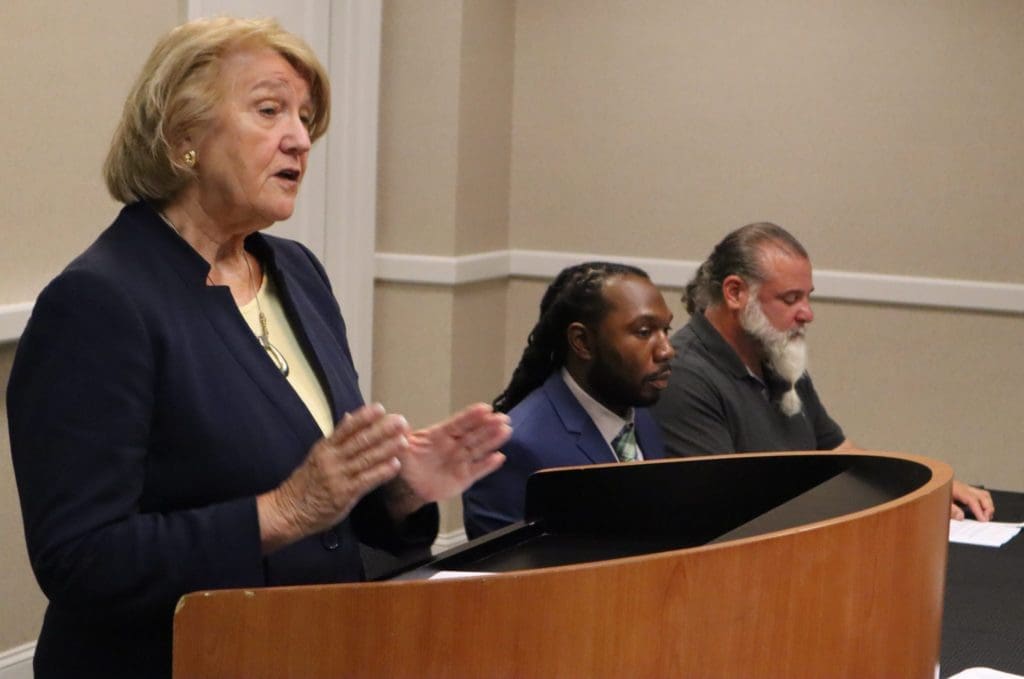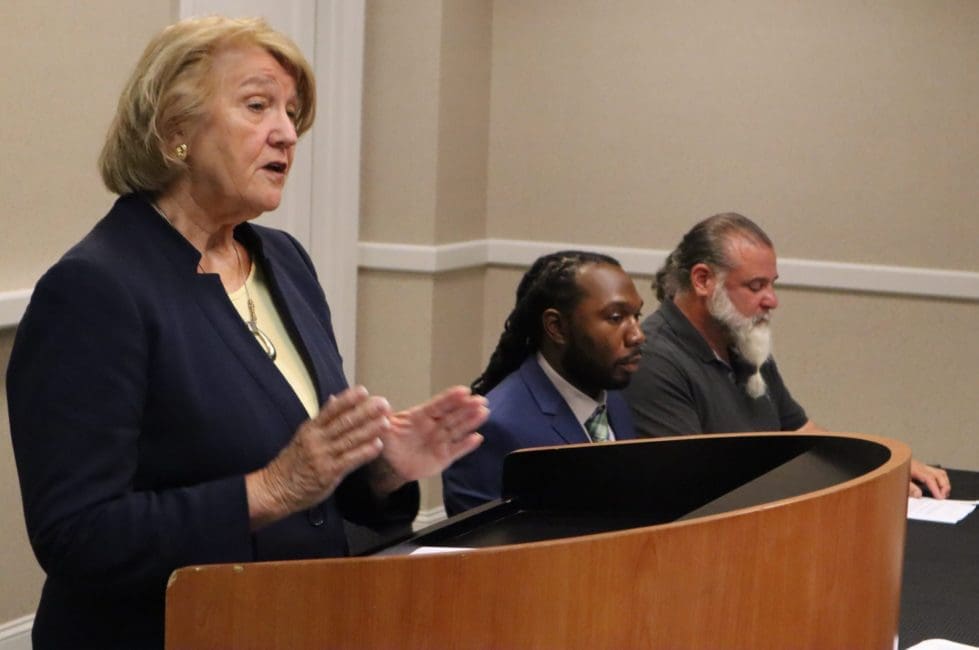

Republican Party chairwoman M. Jane Brady, announces a lawsuit on behalf of Michael Higgin and Michael Mennella (right). Charlie Megginson/Delaware LIVE
The chairwoman of the Republican Party of Delaware has filed suit against the state’s Department of Elections over two new laws legalizing mail-in voting and same-day voter registration.
GOP chair Jane Brady, who was Delaware’s attorney general from 1995 until 2005, said the new laws violate the state Constitution.
“The Constitution provides you must vote in person on election day unless you qualify under very limited conditions to vote absentee,” Brady said during a press conference Friday. “Mail-in voting clearly violates that requirement, as it allows remote voting without declaring or meeting any of those limited conditions.”
Gov. John Carney signed the bills during a private ceremony Friday — something Brady pointed to as evidence that Democrats know they’re acting outside of the law.
“Why are the Democrats hiding,” Brady asked. “Why did Delaware Gov. John Carney sign the bills on a Friday — a day notoriously known in politics for the best time to take action regarding matters on which you don’t want much press coverage — in a private signing ceremony?”
The answer, Brady said, is that “they know that many Delawareans do not support mail-in voting,” and because “the members of the Delaware General Assembly who voted for this bill know that it is unconstitutional.”
Carney’s office could not be immediately reached for comment.
There are two plaintiffs listed in the suit. The first is Michael Mennella, a perennial poll worker who claims that the laws force him to violate the Constitution in his capacity as an election official.
The second is Michael Higgin, a Republican candidate for the Delaware House of Representatives.
Higgin claims the new laws will result in fraud, which will “dilute the votes of his supporters and himself,” Brady said.
“The second reason is,” Brady added, “by allowing people to register up until election day, he’s deprived of his opportunity to argue his positions on policy…because he doesn’t even know who’s registered to vote.”
The lawsuit, filed in the Delaware Court of Chancery, asks a judge to:
- Hold an expedited hearing;
- Declare both laws unconstitutional;
- Issue an injunction stopping the laws from taking effect;
- Affirm that plaintiff Mennella is not required to enforce the new laws; and,
- Award plaintiffs’ attorneys’ fees, expenses, and costs, as well as any other relief the court feels appropriate.
Mennella is a plaintiff in a separate lawsuit, also filed by Brady, challenging the state’s early voting provision. He is married to Delaware Senate candidate Brenda Mennella.
While Brady stressed that the lawsuit is not being brought by the Republican Party of Delaware, it was filed by the Republican chair on behalf of a Republican candidate and a Republican candidate’s husband.
Shortly after the suit was announced, the Republican Party of Delaware sent a press statement with the headline, “We Support Challenges to the New Election Laws.”
Mail-in voting
Senate Bill 320 creates an opt-in vote-by-mail system wherein voters will have to request a ballot before one is sent. Ballots and ballot applications will never be automatically mailed to voters under the bill.
In June 2021, Republicans in the General Assembly effectively stopped the passage of a different bill that would have made no-excuse absentee voting a permanent fixture in Delaware’s elections.
House Bill 75, sponsored by Rep. David Bentz, D-Christiana, would have allowed Delaware voters to request mail-in ballots without providing an explanation.
But the bill, which sought to amend the Delaware Constitution, failed to receive the required two-thirds majority needed in the House of Representatives.
Constitutional amendments are also required to be passed separately during two consecutive legislative sessions.
Twelve Republicans voted in favor of the bill in 2019 during the 150th General Assembly. But in 2021, not one Republican voted in favor of the proposal.
The Constitution requires voters to provide justification before receiving an absentee ballot.
Excuses include being away from the state for work, college or public service, sickness or physical disability, military service or religious tenets in conflict with in-person voting.
RELATED: Senate OKs mail-in voting despite claims it violates Constitution
Supporters of Senate Bill 320 say vote-by-mail is not the same as absentee voting, and the Constitution grants the General Assembly the authority to “prescribe the means, methods and instruments of voting so as best to secure secrecy and the independence of the voter, preserve the freedom and purity of elections and prevent fraud, corruption and intimidation…”
Opponents say that’s a distinction without a difference and when lawmakers failed to amend the Constitution, they developed a workaround to circumvent the law: Senate Bill 320.
During the bill’s Senate hearing, Sen. Colin Bonini, R-Dover, successfully attached an amendment to the bill that requires absentee voters to provide a form of identification — either the last four digits of their driver’s license or last four digits of their social security number.
Supporters included Common Cause Delaware, the ACLU of Delaware and the Attorney General’s Office.
Thirty-four states provide voters the option to cast ballots by mail. In 2020, 43.1% of the country’s electorate voted by mail.
Same-day voter registration
Under previous law, Delawareans had until four Saturdays before an election to register to vote.
House Bill 25 eliminated that deadline. Eligible voters may now register to vote in primary, special and general elections on the same day they cast their ballots.
“Currently, we have an arbitrary deadline several weeks before an election to register to vote, which disenfranchises potential voters,” said Rep. Sherry Dorsey Walker, D-Wilmington, when the bill was up for a vote. “Upon missing this deadline, they are unable to cast ballots, even if they meet all other eligibility requirements. This is an outdated and unfair practice.”
Dorsey Walker said same-day registration has worked in several other states and is proven to safely and effectively increase voter turnout.
According to the National Conference of State Legislatures, same-day registration has existed in Maine, Minnesota and Wisconsin since the mid-1970s.
Since then, more than 20 states and the District of Columbia have adopted same-day registration. Several other states are contemplating similar laws.
In order to register on election day, the bill requires applicants to submit an application and establish their identity by providing a copy of a current and valid government-issued photo identification or a current document displaying the name and address of the person registering to vote, such as a utility bill, bank statement, government check or paycheck.
While debating the bill, Republicans expressed concern that applicants could fraudulently register to vote using a piece of mail with somebody else’s name and address.
“The hope with that would be that people wouldn’t try to be fraudulent with this process,” Dorsey Walker responded. “Some of this will fall on the constituent, too, in addition to the Department of Elections.”
This is a developing story. Check back for updates.


Charlie Megginson covers government and politics for Delaware LIVE News. Reach him at (302) 344-8293 or [email protected]. Follow him on Twitter @cmegginson4.
Share this Post


